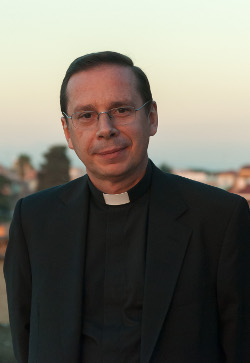
This quote belongs to Five Italian Classics (ed. Rialp), the latest book by the priest and historian Mariano Fazio, and I think it is very appropriate for discovering the value of good literature. It is a literature that contains much truth. It could be called "metaphysical" because it goes beyond its historical or sociological components and can do a lot of good because of its simplicity and its ability to reach the heart of the human being to show him that this heart contains something very big: the capacity for love.
This is the only thing that should concern us, not a brilliant résumé, nor our occupational or leisure prowess that pretends to make us self-sufficient and worthy of childish admiration, nor even less our erudition. In the evening of life, you will be examined for love.says a classic Castilian, St. John of the Cross. Even non-believers can verify that men also examine other men for the love they have put in people and things.
Mariano Fazio introduces the reader to good Italian literature, that which has marked his reading since childhood and which he has rediscovered in his maturity. Five authors and some of their books are enough to come to the conclusion that good literature is the one that aspires to make us betterThe prevailing mentality of many writers of the last two centuries has been that the only criterion of truth is experience, although there are few things less objective than experience.

Bishop Mariano Fazio was born in Buenos Aires on April 25, 1960. He holds a degree in History from the University of Buenos Aires and a doctorate in Philosophy from the Pontifical University of the Holy Cross. He is the author of more than 20 books on modern society and secularization processes.
First of all, the author presents us with this book, which is a book for life's journey, that introduces us to the Florentine poet in the middle of it, and serves Fazio to reach an apt conclusion: we have to accept our own limitations and we cannot solve existential problems by ourselves. Dante himself will have to ask for help, that of the poet Virgil, expression of right reason and human virtues that smooth the path of grace, and that of his beloved Beatrice, who leads him to the light of Paradise. A remarkable reflection of this work is that man does everything for love. Love is equivalent to desire, but the negative consequence is that, if this love is directed exclusively towards oneself and material things, the human being ends up failing because he has not had eyes for the love of God and others.
The second greatest work of Italian literature and one of the favorite novels of the Pope Francis. It tells the story of Renzo and Lucia, two young people who encounter all kinds of obstacles to their marriage, in seventeenth century Lombardy. A nobleman, Don Rodrigo, determined to get Lucia at all costs, will spare no means to make her his. But she will win not only because of her simplicity and natural affection, but also because she trusts fully in divine Providence. Manzoni, on the other hand, does not hide the defects of her lover, Renzo, although his generosity and ability to be moved by the misfortunes of others will help the young man to mature. Renzo's greatest act of maturity will be that of forgiveness, which he will grant to don Rodrigo, when the latter is dying victim of the plague that devastated Milan at that time.
This engaged couple is the protagonist in a succession of characters who have much to teach us. Even evil can serve as a way for others, like the religious Friar Cristobal, to practice Christian charity to the point of heroism. Manzoni's characters present the most diverse traits, for they are still deeply human. There are saints like Cardinal Federico Borromeo, lukewarm ones like the parish priest Don Abundio or evil ones, with a glimmer of repentance, like the knight Sin Nombre. Good triumphs in Los novios because it is a good that acts, not a fearful resignation. There is a clear message: that of overcoming our own limits without ceasing to trust in Providence.
The third work presented, a famous story for children. As the liberal thinker Benedetto Croce said, Pinocchio is made with the wood of humanity. Its author professed the liberal and anticlerical ideology, typical of the time of Italian unification in the 19th century, although the substratum of his work is still Christian. As Croce said in an article in 1942, in a context of concern about the horrors of Nazism, "we cannot not be Christians". Despite his intentions, Pinocchio is not a paragon of virtue.
He understands freedom exclusively as freedom of choice, and is continually deceived by characters such as the Cat and the Fox. He makes the mistake of dialoguing with temptation, but the love of his father, Gepetto, and that of the Fairy will redeem him. Two Italian cardinals, Albino Luciani, the future John Paul I, and Giacomo Biffi knew, with different nuances, how to find a theological dimension in this work, and the latter of them left this paradox written:"The man who only wants to be a man becomes less of a man.".
Perhaps the fourth work studied, it is the one that has withstood the passage of time the worst. Many consider it corny and syrupy, as well as impregnated with excessive nationalist rhetoric. I remember that years ago an Italian Catholic journalist was looking for the imprint of Freemasonry in it. However, Mariano Fazio finds human values in this work that immediately refer back to Christian values: charity, charity, charity and concern for the poorThis coincidence of values can lead believers and non-believers to do things together, instead of engaging in sterile debates.
The last chapter of Fazio's book refers to the Don Camillo series of novels by Giovanni Guareschi, a priest of a small town in northern Italy at odds with the communist mayor Pepone. This priest, popularized by the cinema, was remembered in a speech given by Pope Francis in Florence. The pontiff praised his method: closeness to the people and the prayer. However, don Camillo is too temperamental a man and the crucified Christ of his church, before whom he often prays, will have to remind him of the attitude of a Christian. Therein lies the whole philosophy of Guareschi, which caused him misunderstandings on both sides: respect for those who think differently from usThe overcoming of differences through love; the understanding of the circumstances of friends, the rejection of the absolutization of politics, of humiliations, of joy in the face of the evil of others?
A book by Mariano Fazio, recommended in all aspects.. It is not only an invitation to read. It is also an invitation to be better people and to dialogue with God and with others. But dialogue does not consist in intertwining conflicting opinions. Authentic dialogue is an invitation to friendship.
Antonio R. Rubio Plo
Degree in History and Law
International writer and analyst
@blogculturayfe / @arubioplo